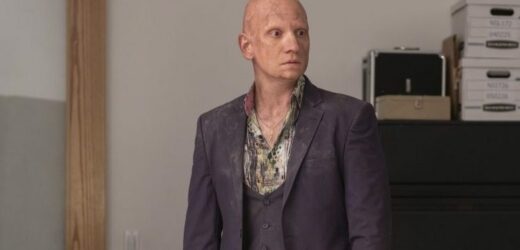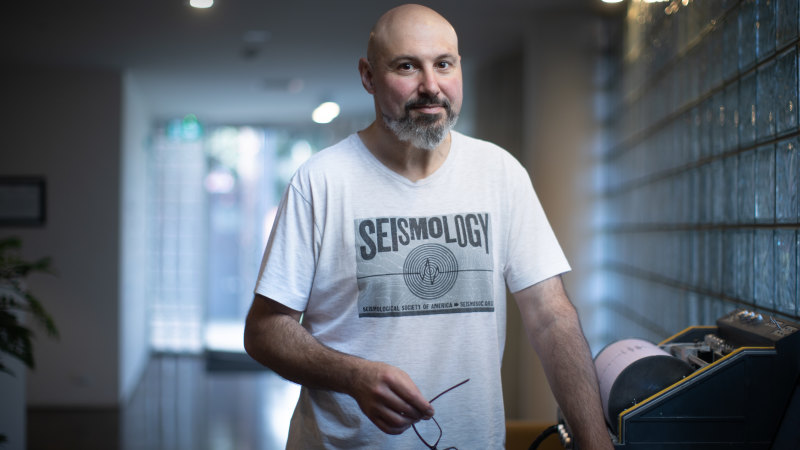SPOILER ALERT: This interview contains spoilers from the series finale of “Barry,” now streaming on Max.
Nothing is sacred in the world of “Barry.”
Played by Anthony Carrigan, NoHo Hank was an immediate fan favorite when the dark HBO comedy series premiered in 2018. As a Chechen mobster with a heart of gold, Hank was the perfect foil to Barry’s (series co-creator Bill Hader) perpetual seriousness. And when Season 3 got dark and depressing after Cousineau (Henry Winkler) learned that Barry had murdered his girlfriend (Paula Newsome), Hank was one of the show’s last remaining sources of comedic relief … until he killed his boyfriend Cristobal (Michael Irby) midway through the show’s fourth and final season.
In the Season 3 finale, Hank is forced to murder Cristobal’s homophobic wife, who has kidnapped and tortured him. Confronting mortality in that way makes Hank feel so weak and scared that he brutally murders his and Cristobal’s business partners as soon as he gets the chance to regain the protection of his Chechen brethren. And when Cristobal breaks up with him over it, Hank has his lover killed, too. He then spends the next eight years denying he had anything to do with the hit, which puts him back in harm’s way after Fuches (Stephen Root) brings it up after his prison release and their argument devolves into a violent feud.
Desperate for his safety, Hank decides to help Fuches carry out his vengeance on Barry. He kidnaps Sally (Sarah Golberg) and their son, John (Zachary Golinger), to lure Barry forth, but Fuches ends up giving him an easier choice. Instead of putting Sally and John in harm’s way, Hank has the option of confessing to Cristobal’s murder, and Fuches will leave him alone. Hank begins talking through how scared he felt, and how much he loved Cristobal, but stops himself at the last second, calls Fuches a liar and says that the deal is off. A shootout erupts, and Hank dies at the feet of his Cristobal statue, miserably holding its hand.
Variety interviewed Carrigan about fear, heartbreak and the demise of North Hollywood Henry.
Did you already know Hank was going to die when you started shooting Season 4?
I’m not entirely sure when Bill told me, which is a good indicator that I totally blocked it out of denial. I do remember having one conversation with him, and we were able to unpack it and really understand that Hank having made these decisions to double down, in terms of him trying to be a gangster, have ultimately led to his demise. You live the life of a gangster, you have the death of a gangster. That’s just how it goes.
What conversations did you have with Michael Irby about Hank killing his character, and Hank’s eventual death?
You know, we didn’t really talk too much about the details. I think we wanted to explore it in the space. We did have rehearsal, which was very helpful in terms of understanding what that scene is really about — and it’s kind of fucked up, but at its core, it’s a breakup. Our goal was to have audiences look at this altercation and see both sides of it, and understand that both sides are compromised. No one’s completely wrong. It’s a really unfortunate set of circumstances.
The Season 3 finale was so traumatic for Hank. We see in his eyes at the end that he’s changed as a person, that he can’t continue forward as the “nonviolent” bad guy he’s always been. How have you processed that arc as an actor? What happened psychologically that made him capable of having the love of his life killed?
When you backtrack a little bit, the key to Hank’s destructiveness is his pain and his insecurity. Even back in the beginning of Season 2, when Barry calls Hank an idiot, you see Hank take on this more dangerous side. It’s all stemming from deep hurt, from Hank having his feelings hurt. That’s when the menacing power steps in.
Hank had managed to skate past all this stuff and have goons carry out the violent acts that needed to be done to establish a criminal enterprise. Up until Season 3, Hank’s naiveté had never quite caught up with him. Hank’s foolish nature never had real consequences. But then you look at what happened with him going on this kind of wacky search for Cristobal, going through the streets of Bolivia literally asking if anyone knows the Sifuentes family, and ends up getting a blow dart in the neck. Which is a very comedic scene, but at the same time, it’s that foolishness that got him in a really horrific dungeon sequence where he almost loses his life, and and it’s terrifying. The vulnerability that Hank has, and the danger that’s associated with the vulnerability, comes to a crescendo in Season 4. He realizes in that final scene with Cristobal that you have to make the hard decisions, or you get walked all over. All of that is stemming from that same pain, from that self-awareness that he is kind of foolish, but not wanting to be taken advantage of. But swinging in the opposite direction ends up getting him in even more trouble.
And it’s Cristobal who brings that dangerous vulnerability out of him, so he had to die.
Yeah, exactly. And their whole enterprise of trying to build a crime syndicate off of love, kindness and everyone getting along, Hank sees very quickly that they’re all going to get gunned down if they don’t have any weapons on them — if they’re not going to take violent actions.
With Cristobal dead and Barry of the grid, Hank’s primary relationship as “Barry” ends is with Fuches, who may see Hank’s true colors more than any other character. What was it like building that with Stephen Root this season?
It was two people who are facing off against each other: One who had pretty much everything stripped away from him, and became really honest with himself — and on the other side, with Hank, you have someone who is just deeply, deeply rooted in denial. When those two forces meet, it makes for it makes for really interesting storytelling.
How do you interpret Hank’s final speech to Fuches? He almost confesses to having Cristobal killed but never says those words, then basically takes it all back at the end.
It was a really delicate scene, obviously. There’s a very clear veneer that Hank has been trying to keep up the entire season, and then Fuches throws him the curveball of, “New deal: Just be honest about what happened, and I’ll let this whole thing go.” It quite deftly finds a direct line to Hank’s vulnerability. But with that vulnerability is also fear. When Hank is faced with that decision, he’s being flooded with guilt and sadness, but there’s that danger there as well. I think that’s why he couldn’t quite fully commit.
Why do you think Fuches needed that from him? Fuches and Cristobal didn’t really have a relationship, so what does he stand to gain from hearing the confession?
Fuches becomes the one character who begins to really break the mold — I suppose Sally does too — of not pretending anymore to be something else, but rather actually just acknowledging who he really is. He becomes, weirdly, this kind of moral compass. He’s the example of being honest with himself. Granted, he’s being honest with himself as a ruthless mob boss, but he’s also just being honest. And seeing Hank not be honest is driving him nuts. I think he represents what it means to step into your honesty.
What was it like to film the shootout? As Hank dies holding hands with his statue of Cristobal, it seems like some realization crosses his face that we don’t get to hear about.
It was really important to Bill not to glorify any of this violence, and to kind of subvert all of the action standoff tropes of two gangs right across from each other. He took it in a very real direction. What if there’s all of these men facing off against each other with high-powered weaponry? Obviously, everyone’s going to die. Obviously, everything is going to be really violent and really messy and disgusting. He didn’t want to shy away from from any of that violence.
And with Hank in those final moments underneath the statue of Cristobal, essentially, it’s him seeing very clearly what he has lost in this life based on those choices. There’s something beautiful about him ending it holding Cristobal’s cold, metal hand — but there’s something really terrifying about it.
What do you make of the end of the episode, when Barry’s son grows up to watch this biographical film that gets everything wrong, and makes Barry look like a hero?
I love it. I think it’s so brilliant and so unexpected, and I think that’s what this show does really well. It takes you in directions that you had no idea it was going, but in ways that really track. It’s not just surprising for surprise’s sake. It really makes sense. The ending is essentially what Hollywood would do to this story.
This interview has been edited and condensed.
Read More About:
Source: Read Full Article


